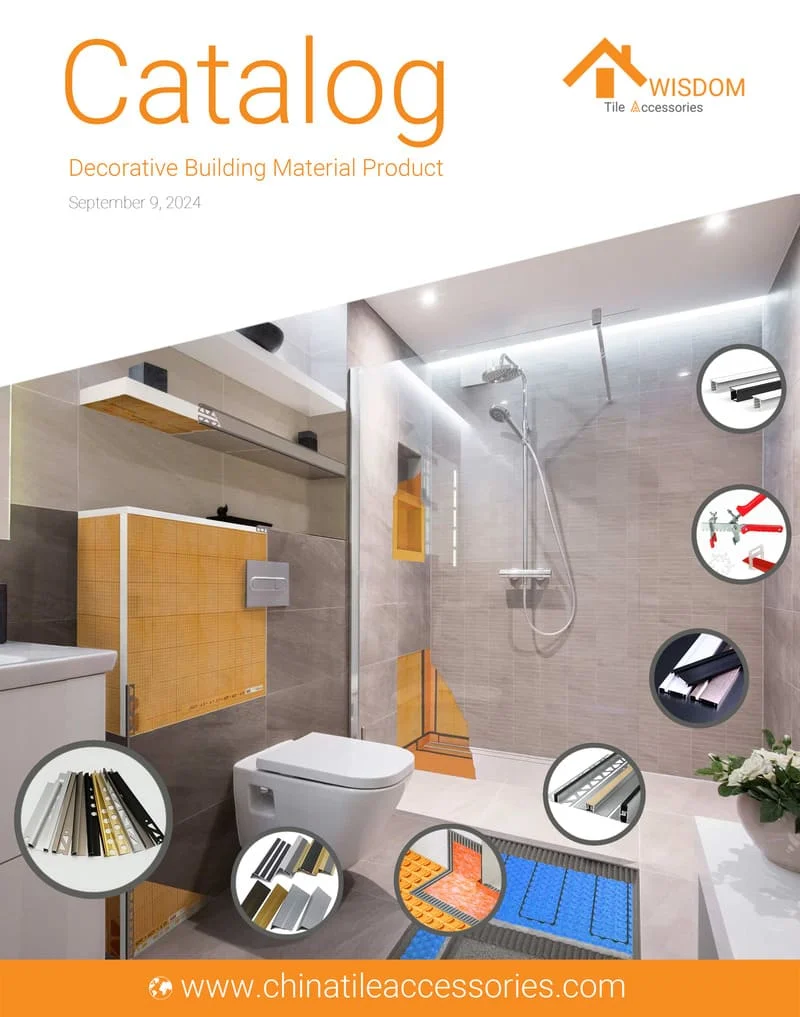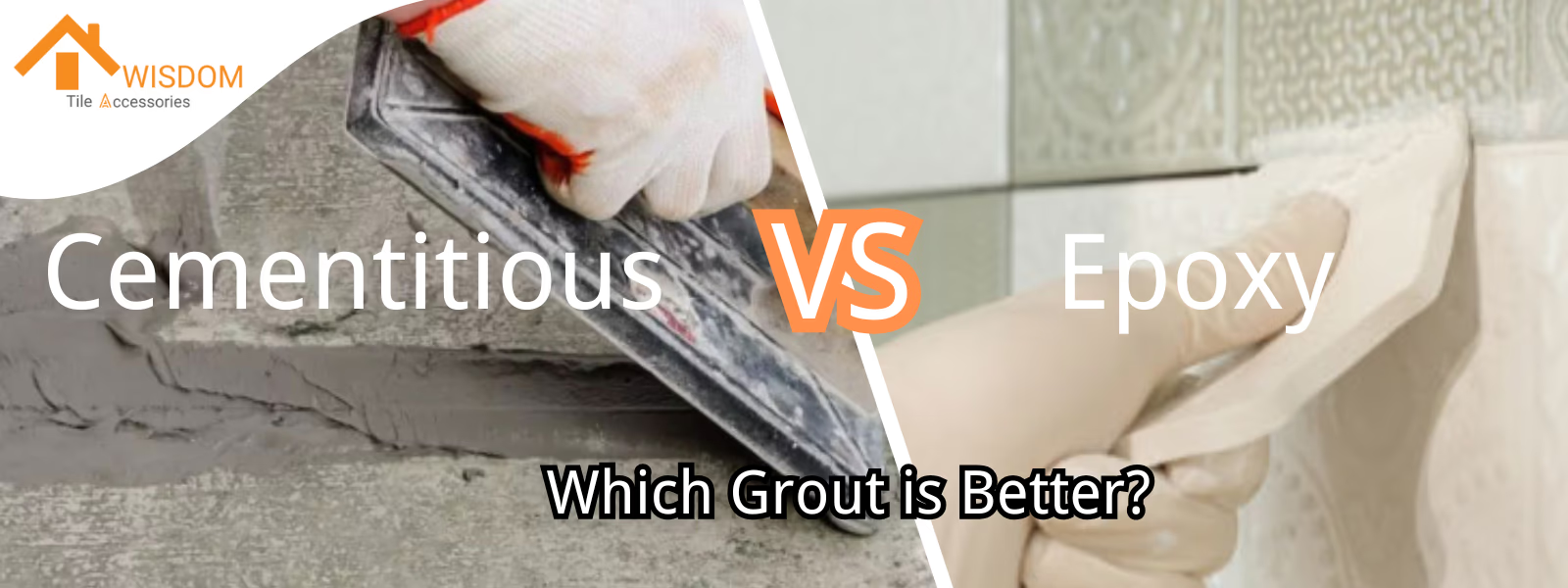
Thinking about cementitious vs epoxy grout for your next tile project? These are two primary types with big differences in performance and application. Beyond basic cement grouts, epoxy offers distinct advantages, but comes with its own considerations. Many wonder which is better for their specific job. This guide will help you understand their pros, cons, and ideal uses to make the right choice.
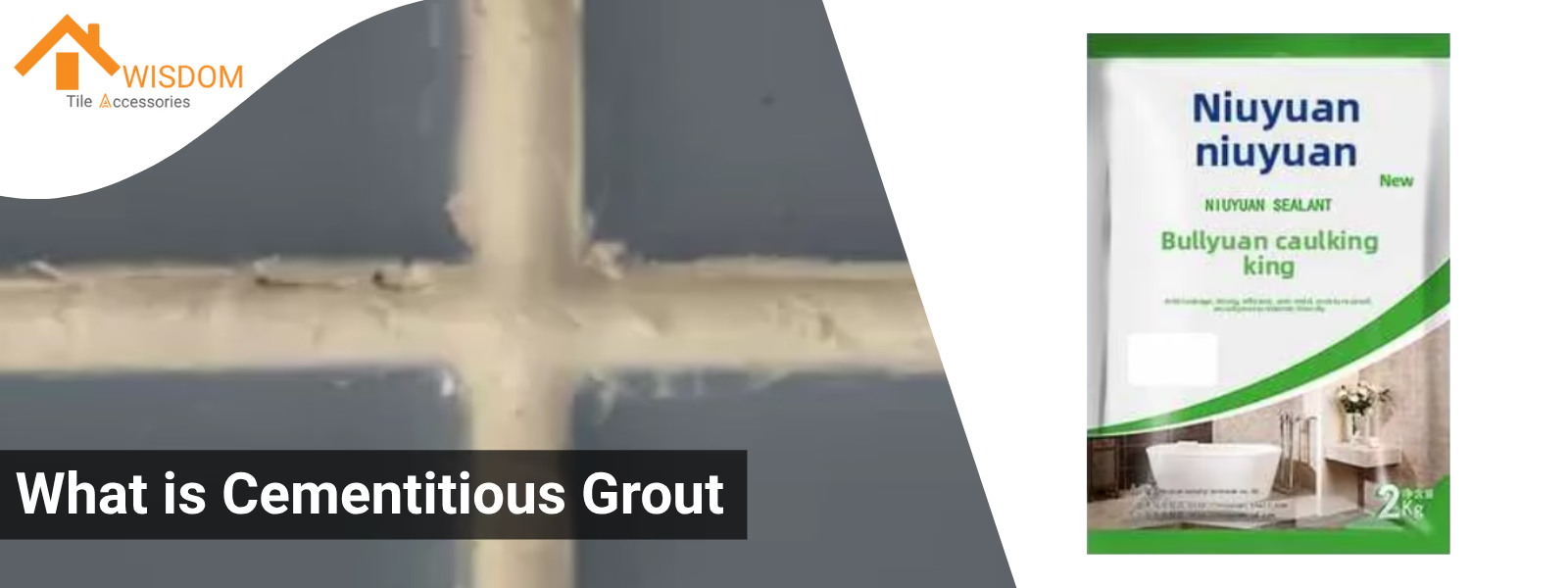
What is Cementitious Grout
Chances are, when you think of grout, you're picturing cementitious grout. It’s been the workhorse in the tiling world for a very long time, and while formulations have improved, its basic nature as a cement-based product remains.
Composition and Characteristics
At its heart, cementitious grout is a blend of cement, various aggregates (which determine if it's sanded or unsanded), pigments for color, and water which activates it. You'll often find polymers added to modern mixes to boost performance, things like flexibility and water resistance. This category broadly splits into two main types you'll frequently encounter: the familiar sanded grout and unsanded grout.
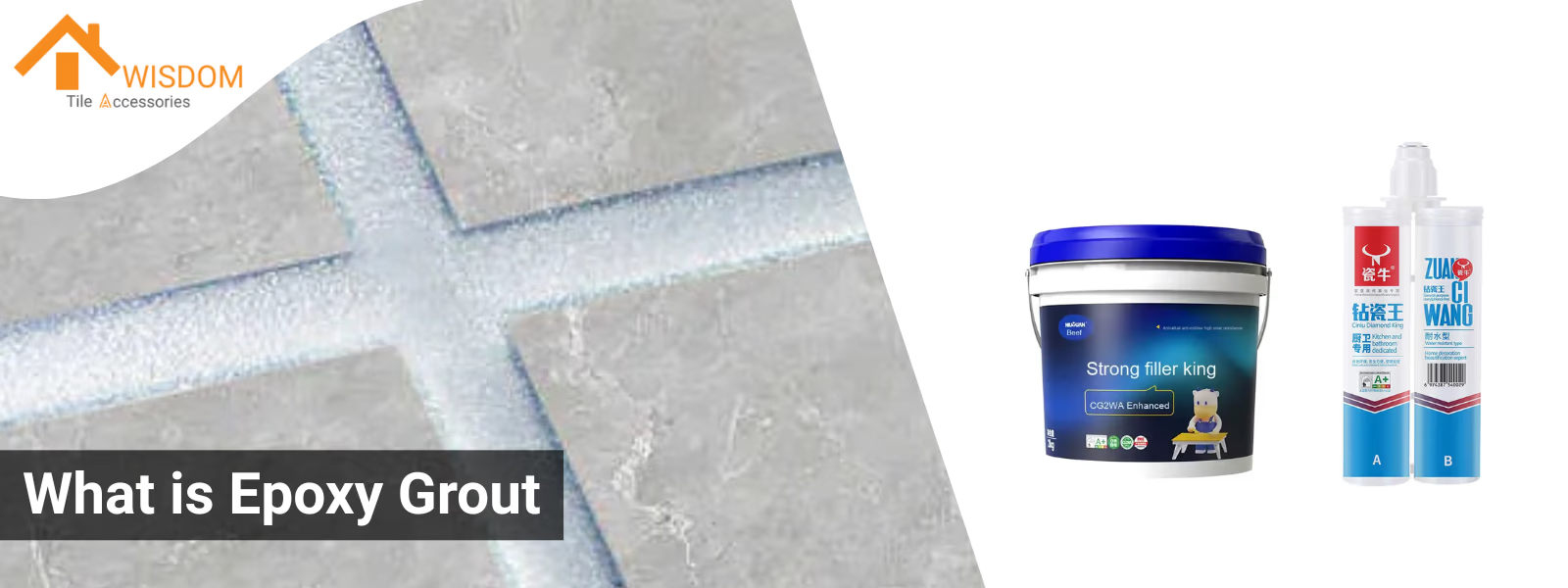
What is Epoxy Grout
Unlike cementitious grout which is a single component until mixed with water, epoxy grout is a reactive system typically including resin, a hardener, and an aggregate like sand or ground stone. It offers a significant step up in performance from traditional cement options.
Composition and Mixing
As mentioned, epoxy grout usually comes as a multi-part kit. You don’t just add water here. Instead, you combine these components – the epoxy resin, the hardener, and any aggregate – and that kicks off a chemical reaction causing the grout to cure and harden, giving it its distinct properties.
Main Differences Between Cementitious and Epoxy Grout
So, what really sets these two apart? It boils down to how they're made and how they work. Cementitious grout cures through hydration – the chemical reaction of cement with water. Epoxy grout, on the other hand, cures through a chemical polymerization process when its resin and hardener components are mixed. This fundamental difference in chemistry is what leads to their vastly different characteristics in terms of durability, water resistance, and application.
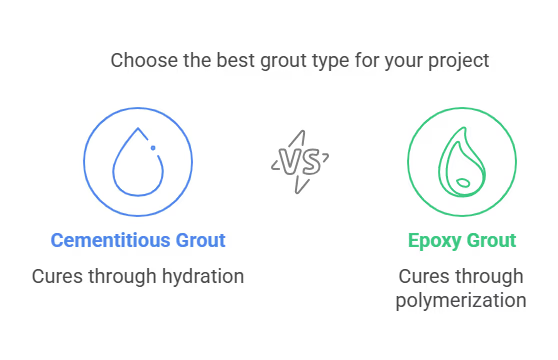
Cementitious Grout Pros and Cons
Like any material choice, cementitious grout comes with its own set of upsides and downsides that you’ll want to weigh.
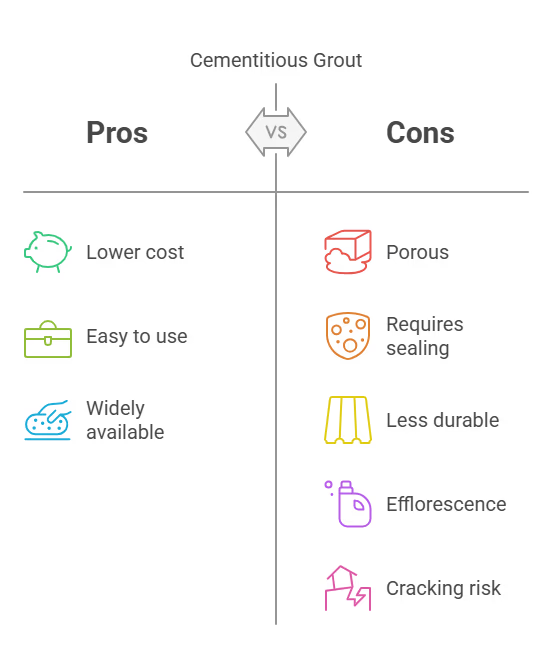
Advantages of Cementitious Grout
A big plus for cementitious grout is typically its lower upfront cost compared to epoxy. It’s also widely available from almost any tile or home improvement store. Most tile installers have years, if not decades, of experience working with it, making it a very familiar and generally easier product to handle, especially for standard applications or for those newer to tiling.
Disadvantages of Cementitious Grout
The traditional nature of cementitious grout means it has some inherent weaknesses. Its primary drawback is being porous. This porosity allows it to absorb water and spills, which can lead to staining over time and can make it a place for mold or mildew to take hold if it’s not kept dry or properly sealed. Because of this, it requires sealing after installation and then re-sealing periodically to maintain that protection. Another common issue is efflorescence – that unsightly white, salty buildup that can sometimes migrate to the surface of cement products. While it’s perfectly serviceable for many situations, it’s generally less durable and not as wear-resistant as epoxy grout when it comes to harsh chemicals, heavy foot traffic, or aggressive cleaning routines. It can also be prone to cracking or shrinking, particularly if the wrong type (sanded vs. unsanded) is chosen for the grout joint width or if there’s movement in the substrate.
>> See What is Grout Efflorescence & How to Avoid It?
Epoxy Grout Pros and Cons
When you're looking for top-tier performance, epoxy grout steps into the spotlight. But like anything, it has its own set of advantages and disadvantages to consider carefully.
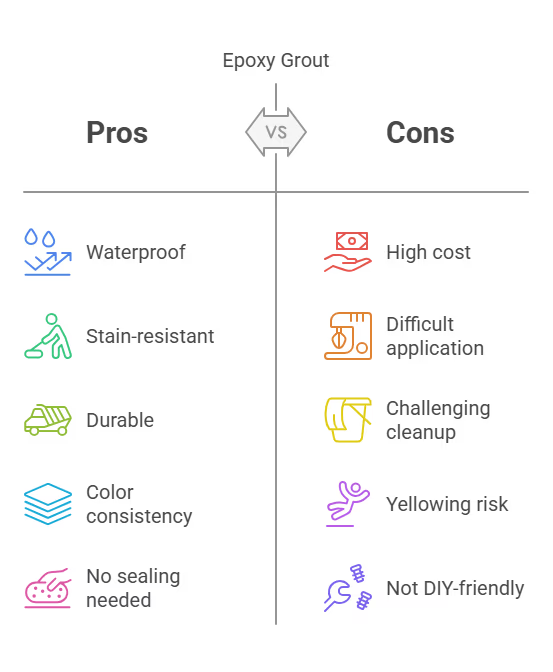
Advantages of Epoxy Grout
The real headline with epoxy grout is its incredible resilience. It's virtually waterproof, meaning it absorbs almost no water, which is a massive plus in wet areas. This also contributes to its excellent stain and chemical resistance – things that would easily mar cement grout often wipe right off epoxy. You'll also find it offers extreme durability and strength, standing up to heavy wear and harsh conditions far better than its cementitious counterparts. Another key benefit is its color consistency; because it doesn't absorb moisture, the color you see when it's dry is the color it stays, unlike cement grout that can darken when wet. And a big labor-saver: epoxy grout does not require sealing, ever.
Disadvantages of Epoxy Grout
However, this high-level performance does come with some trade-offs. The most significant is usually the higher cost, both for the material itself and often for installation, as it's a more specialized product. Epoxy grout is also known for its difficult application. It has a shorter "pot life" once the components are mixed, meaning you have to work relatively quickly and in smaller batches. Cleanup can also be more challenging if any residue is left to harden on the tile surface. Some formulations, particularly lighter colors, can yellow over time if exposed to direct sunlight. It's generally less forgiving for DIYers due to these application complexities. And while it doesn't need sealing, it's also important to know that you cannot (and should not) seal epoxy grout; applying a sealer can actually be detrimental to its surface.
Comparing Grout Performance
Let's put cementitious and epoxy grout head-to-head on some key performance metrics that often concern homeowners and pros.
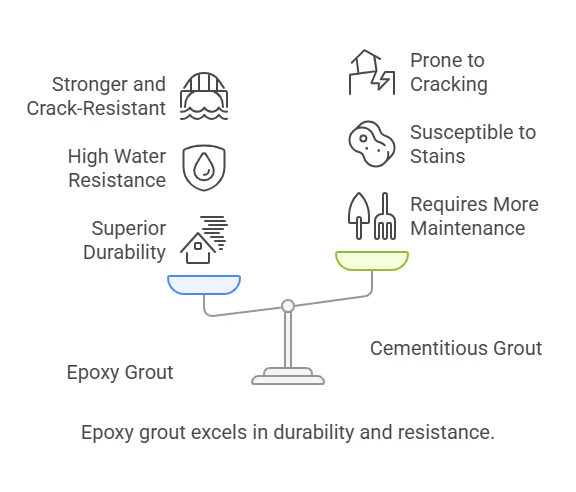
Durability and Lifespan
When it comes to sheer toughness and how long it will last, especially in demanding environments, epoxy grout generally has the edge. Its chemical composition makes it highly resistant to breaking down from wear, chemicals, or moisture over time. Cementitious grout, while durable for many uses, will typically show wear sooner and may require re-grouting or more intensive maintenance over its lifespan compared to a well-installed epoxy.
Water and Stain Resistance
This is a clear win for epoxy grout. Its non-porous nature makes it practically impervious to water and most common household (and even many commercial) staining agents. Cementitious grout, even when sealed, can still be susceptible to deep-set stains and moisture penetration if the sealer wears down or isn't applied perfectly.
Strength and Cracking
In terms of compressive strength and resistance to cracking, epoxy grout is significantly stronger than cementitious grout. When correctly installed in properly prepared joints, it's much less likely to crack or chip out. Cementitious grout can be prone to hairline cracks due to shrinkage, movement, or if the mix wasn't optimal.
Dealing with Wear and Tear
For areas that see a lot of foot traffic, scrubbing, or potential abrasion, epoxy grout holds up much better. Its hard, dense surface resists wear and tear effectively. Cementitious grout, being softer, can gradually wear down over time, sometimes creating "gutters" between tiles where dirt can collect, especially in high-use floor applications.
Practical Grout Differences Cost and Installation
Beyond pure performance, the practical aspects of cost and how easy (or difficult) each grout is to install play a huge role in your decision.
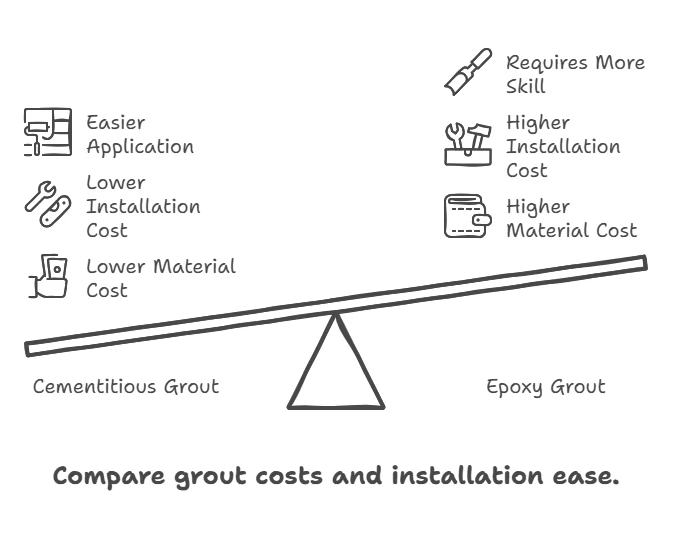
Price Comparison
There's a noticeable difference in cost when you look at these two grout types:
When comparing total project cost, it's important to factor in both material and potential labor differences.
Application Ease and Working Time
This is where the experience level of the installer really comes into play:
Many professionals who are adept with epoxy can achieve excellent results efficiently, but for those less familiar, it can be a steep learning curve.
Choosing the Right Grout for Your Project
So, with all this information, how do you decide which grout is the "better" one for your specific tile installation? It’s rarely a one-size-fits-all answer.
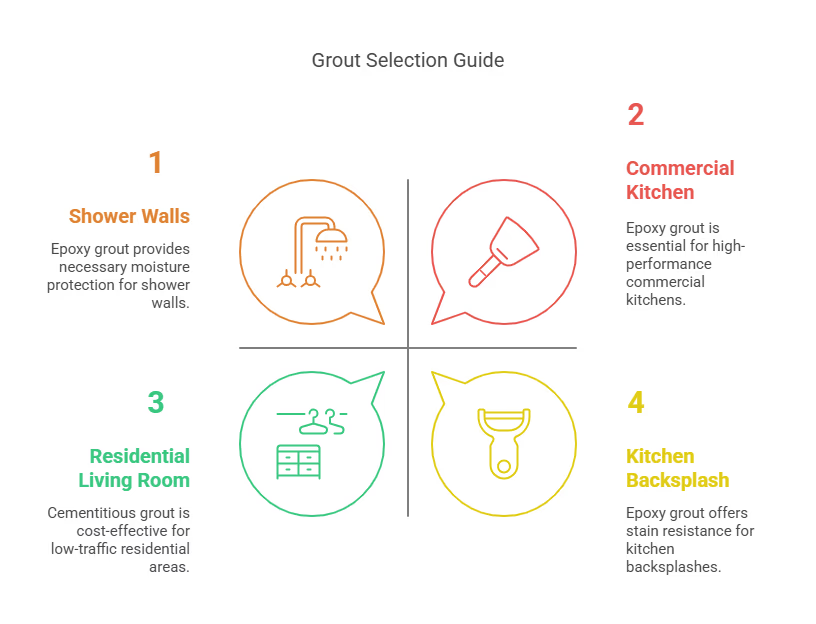
When Cementitious Grout is Preferred
Cementitious grout often makes good sense in several common scenarios:
When Epoxy Grout is Preferred
Epoxy grout really comes into its own and is often the superior choice when performance under demanding conditions is critical:
Grout Choice by Specific Area (Recapping Key Scenarios)
To quickly recap, think about it this way:
Ultimately, "better" depends on balancing performance needs with budget and application realities.
How to Tell Cement Grout from Epoxy
Sometimes you might encounter existing grout and wonder what type it is, especially if you're planning a repair or a deep clean. While a lab test is definitive, there are a few clues:
If you're really unsure and it's critical to know (for instance, before applying a specific type of cleaner), consulting with a tile professional might be the best course.
What Grout Do Professionals Use?
This is a common question, and the answer is: professionals use both cementitious and epoxy grout. There isn't one type that all pros exclusively use.
A qualified and experienced tile contractor will choose the grout type based on several factors, very similar to what we've discussed:
Ultimately, a true professional recommends and uses the grout that is best suited for the application to ensure a long-lasting, quality installation, rather than having a blanket preference for one type over another. They understand the "why" behind each choice.
Can You Replace Cement Grout with Epoxy?
Yes, it's technically possible to replace existing cement grout with epoxy grout, but it's a labor-intensive process and not a simple DIY task for most.
Here's what's involved:
- Complete Removal of Old Grout: All the old cementitious grout must be meticulously removed from the joints. This typically requires specialized grout removal tools (manual or power tools). Leaving any old grout behind can compromise the new epoxy grout's bond and performance. The joints need to be clean and sound.
- Proper Joint Preparation: Once the old grout is out, the joints must be thoroughly cleaned of dust and debris.
- Epoxy Grout Application: The epoxy grout is then mixed and applied according to its specific instructions, which, as we've noted, can be more demanding than cementitious grout.
Because of the difficulty in completely removing old, hardened grout without damaging the tiles, and the precision required for epoxy application, this is often a job best left to experienced professionals. If you're considering this, get quotes and discuss the process with qualified tile contractors. It can be a great way to upgrade an existing tiled surface's durability and stain resistance, but the effort and cost need to be weighed.
Making Your Final Grout Decision
So, after exploring the differences, pros, cons, and applications, which grout truly is "better" – cementitious or epoxy?
The answer, as you've likely gathered, is: it depends entirely on your specific project. There's no single "best" grout for every situation.
The best advice is to match the grout to the job's specific requirements. Consider the location, the type of tile, your budget, and the level of performance you expect. By understanding the strengths and weaknesses of both cementitious and epoxy grout, you can make an informed decision that ensures your tile work not only looks great on day one but continues to perform well for years to come.
Frequently Asked Questions (FAQ)
Which is better, epoxy grout or cement grout?
Neither is universally "better"; it depends on your project. Epoxy grout offers superior durability, water resistance, and stain proofing, making it better for wet areas and demanding applications. Cementitious grout is more budget-friendly and easier to install, making it suitable for many standard residential projects.
What are the disadvantages of epoxy grout?
The main disadvantages of epoxy grout are its higher material and installation cost, more difficult and time-sensitive application process (shorter pot life, harder cleanup), and the potential for lighter colors to yellow over time with UV exposure. It's also less forgiving for inexperienced DIYers.
Is epoxy grout really better?
Epoxy grout is "better" in terms of performance characteristics like water resistance, stain proofing, durability, and strength. However, "better" for a specific project also considers cost, ease of installation, and whether those high-performance features are truly necessary for the application.
Is epoxy grout more expensive than cement grout?
Yes, epoxy grout is generally more expensive than cementitious grout, both in terms of the material cost per unit and often in terms of installation labor costs due to its more demanding application process.
How long will epoxy grout last?
When properly installed, epoxy grout can last for many years, often outlasting the tiles themselves, especially in demanding environments. Its durability and resistance to wear, water, and chemicals contribute to a very long lifespan with minimal degradation.
Does epoxy grout crack easily?
No, epoxy grout is highly resistant to cracking when installed correctly in properly prepared joints. It is significantly stronger and less prone to shrinkage cracks compared to cementitious grout.
How can you tell if grout is cement or epoxy?
Epoxy grout usually has a very smooth, hard, plastic-like surface that resists scratching and doesn't absorb water (water will bead on it). Cementitious grout, even if sealed, may feel slightly gritty (if sanded) and can be more easily scratched or indented. An unsealed cement grout will darken when wet.
Can you replace cement grout with epoxy grout?
Yes, you can replace cement grout with epoxy grout, but it requires complete removal of the old cement grout down to a sound base, which is a labor-intensive process. The joints must then be thoroughly cleaned before applying the epoxy.
What is cementitious grout used for?
Cementitious grout is used for a wide range of tile installations, including floors, walls, and backsplashes in residential and light commercial settings. It's a versatile, cost-effective option for areas where extreme water or stain resistance isn't the primary concern, and where joints are within the appropriate width for sanded or unsanded versions.
What is the strongest grout?
Epoxy grout is generally considered the strongest type of grout available for tile installations. It has significantly higher compressive strength and bond strength compared to traditional cementitious grouts.
Can water seep through epoxy grout?
No, epoxy grout is virtually waterproof and non-porous. Water will not seep through properly installed epoxy grout, making it an excellent choice for wet areas like showers and steam rooms.
What are the problems with epoxy grout?
The main problems or challenges with epoxy grout include its higher cost, the difficulty and shorter working time of its application (making it less DIY-friendly), the care needed for cleanup to avoid haze, and potential yellowing of light colors in direct sunlight.


